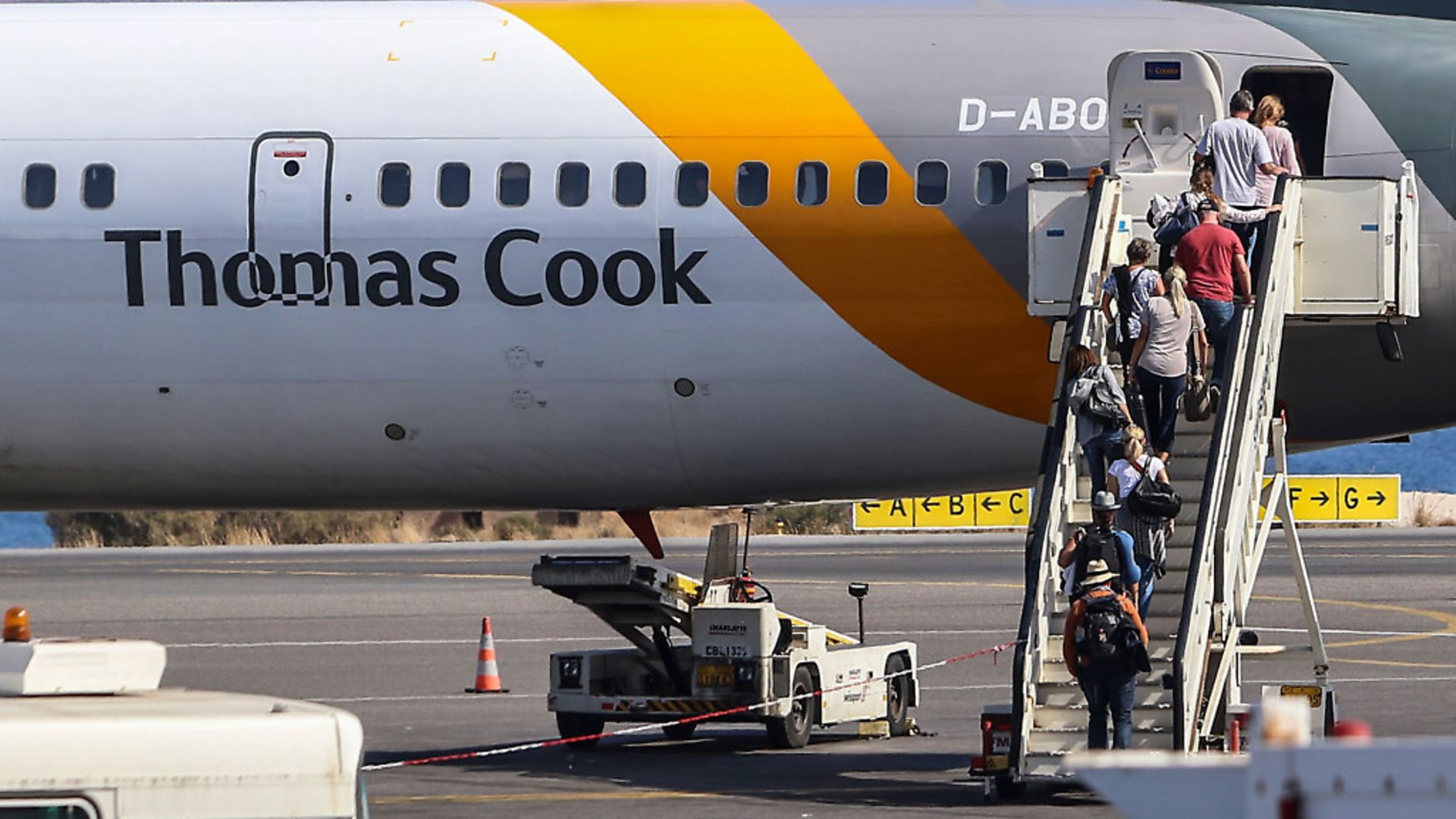
The firm’s fall has provided a number of lessons for the UK ahead of a possible no-deal Brexit, says JAMES BALL.
The UK got a preview of what chaos in Europe looks like this week, at least on a comparatively small scale.
That came not at the Supreme Court – although that’s caused ructions enough – but with the long-anticipated collapse of Thomas Cook, which left 150,000 people stranded overseas and a public body needing to manage a weeks-long operation to get them all home.
The company’s downfall provides a number of lessons for the UK ahead of a possible no-deal Brexit. The first is that it represents a good example of how short-selling actually works. Short-selling became the topic of intense interest in certain corners of the Remain-supporting internet recently following allegations that hedge funds “linked to Boris Johnson” were “shorting” the UK ahead of a no-deal.
In practice, people can only ‘short’ – place a bet that a stock will go down, instead of up – companies, rather than countries. Thomas Cook was shorted by many investors who bet the weight of its debt would end the company, and they were proved right.
The firm’s demise also serves as a reminder that few companies will collapse ‘because of Brexit’. There is rarely one reason for a business to fail, and Thomas Cook failed for many reasons – it was saddled with too much debt, the weather didn’t work in its favour, and in an online era many travellers don’t need package holidays any more.
Lots of businesses have multiple problems already but, barring another shock, will be likely to survive them. The very possibility of Brexit was enough of a shock to Thomas Cook’s business to help deliver the coup de grace.
A no-deal Brexit would be a shock on a much bigger scale and take down companies far less damaged than Thomas Cook, which had been on the verge of crisis for close to a decade. Much as a bad winter flu season kills people who are already elderly or unwell, an economic crisis ends companies that are already struggling.
There will already be another excuse for those who don’t want to admit Brexit is damaging the country – but it won’t mean it’s not playing a central role in doing the damage.
Most significant, though, is Thomas Cook as a taste for what disruption looks like. This was one travel company which operated a fleet of just 34 planes (by contrast, British Airways has 280 and Ryanair has more than 300) and had just 150,000 people overseas. The result is a rescue operation that will cost around £100 million of public funds.
That is just the beginning, though. The companies who loaned money to Thomas Cook have to find out if they’ll get any of it back (they won’t get much). Its shareholders will be wiped out. The companies who supplied Thomas Cook will likely not be paid for any goods or services they hadn’t already been paid for. The company’s employees will need new jobs, and will need the support of the state until those are found.
And despite the collapse of Thomas Cook being no-one’s fault but its own management team, politicians and corporate PR people alike have been pointing the finger of blame towards the government, suggesting it should have acted to bail the company out. When companies collapse, the consequences spread very widely indeed – and last for a long time. Even a decade after the collapse of Lehman Brothers, administrators were still working to unpick the company – and few businesses collapse without dozens of people lining up to blame the government.
So this week’s chaos has been about one travel company. Imagine that multiplied dozens and hundreds of times over, and you have the impact of any hard Brexit, let alone a no-deal Brexit. And that’s just on the business collapse side.
Government itself will have to work to handle the cascading fallout of multiple companies collapsing while also dealing with widespread chaos from any number of other sources, many of which will have to take higher priority – delays and disruption at ports, shortages of essential supplies and medicines, civic unrest, and more.
For all the cheap talk about ‘Blitz spirit’ or British stoicism, the UK has been a stable democracy for the entire lifespan of every working-age adult in the country. We have never had to deal with the kinds of crisis many of our fellow European countries have faced, and we are ill-prepared for this one.
We have a government that can’t win a vote, can’t win a court case, and can’t even submit a simple statement to court. We have an opposition that is so determined to ignore the potential Brexit crisis coming that it will rig a vote of its own members to avoid having to have a position on it. And we have a parliament that can’t make any decisions other than to give itself more time to make decisions.
Anyone contemplating a no-deal Brexit should do the following: They should look closely at the chaos Thomas Cook is leaving in its wake. They should imagine it multiplied by a factor of at least a hundred. They we should imagine any of our current political leaders trying to deal with that. And then they should think again.










